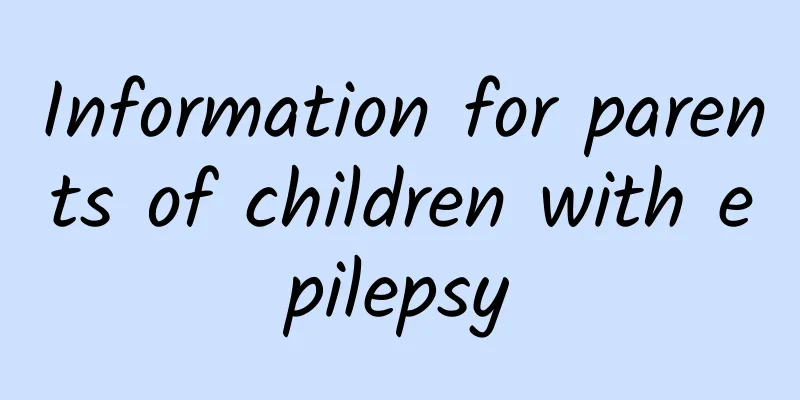Information for parents of children with epilepsy

|
Epilepsy is a chronic disease caused by abnormal brain discharges. For children with epilepsy, parents may need to learn more about the disease and medication in order to better care for their children. Let's learn more about it below~ 1. What are the symptoms of an epileptic seizure? There are different types of seizures, each with different symptoms. Tonic-clonic or generalized seizures usually cause unconsciousness, stiffness, and convulsions. Other types may have less noticeable symptoms, such as tremors in one arm or part of the face, sudden loss of focus, and staring. Most seizures last only seconds or minutes. 2. What should parents pay attention to when an epileptic seizure occurs? When a child has an epileptic seizure, parents should not panic. The child should be laid flat with the head tilted to one side, foreign objects in the mouth should be cleared and the airway should be kept open. Be careful to protect your child's head to prevent it from hitting the ground or other objects and causing injury. 3. What should parents pay attention to when taking medication for children with epilepsy? Taking anti-epileptic drugs may cause fatigue, dizziness, etc. Parents should promptly inform the doctor of any discomfort in their children so that the medication and its dosage can be adjusted. If a child develops a rash on the skin after taking the medication, the doctor should be informed immediately, as this may be a serious side effect. Parents should remember to inform the doctor of other medications that their children are taking, because these medications may increase or decrease the blood concentration of anti-epileptic drugs, resulting in increased side effects or reduced efficacy. 4. Do children with epilepsy need to take medication for life? Most children who have been seizure-free for at least 18 to 24 months can consider stopping antiseizure drugs. Antiseizure drugs should be tapered slowly rather than stopped abruptly. 5. How to prevent recurrence of epilepsy? The most important thing is to take the medication strictly according to the doctor's instructions. Do not stop taking anti-epileptic drugs or reduce the dosage at will, as these factors may cause epileptic seizures. Get enough sleep; lack of sleep can increase the risk of epileptic seizures. Healthy diet. 6. When should I go to the hospital for treatment? Follow up with your doctor as directed. If your child's seizures become more frequent or last longer than before, he or she should also be taken to the hospital to see a doctor. If a seizure lasts more than 5 minutes or occurs repeatedly within a few minutes, go to the hospital immediately. References: 1. Gloss D, Pargeon K, Pack A, et al. Antiseizure Medication Withdrawal in Seizure-Free Patients: Practice Advisory Update Summary: Report of the AAN Guideline Subcommittee. Neurology 2021; 97:1072. |
<<: An 18-year-old boy was preparing for myopia surgery and found a retinal tear
>>: Important medication times
Recommend
The lochia disappeared 8 days after delivery
After giving birth, no matter which method of del...
What is the reason for postpartum bleeding?
Some mothers may have some examinations after giv...
Is pelvic effusion 1.0 serious?
It is common for women to suffer from gynecologic...
When is the best time to prune the swallowtail palm? What should you pay attention to when pruning the swallowtail palm?
The Crane's Palm is a common succulent plant ...
Eight benefits of eating honey for women
Pure honey is made from plant nectar collected by...
What are the symptoms of uterine myopathy?
Many people must be very unfamiliar with the dise...
Can I take a hot spring bath during my menstrual period? Don't make the same mistake again.
I believe all female friends know that you cannot...
Frontline of Epidemic Prevention | Is the ninth edition of the prevention and control plan still effective? Can vaccination wait? ... The authoritative answer is here!
On August 10, the Joint Prevention and Control Me...
Vaginal gas discharge
I don’t know if women have ever experienced vagin...
Home COVID-19 self-test is here! What is the difference between antigen test and nucleic acid test?
According to the National Health Commission websi...
What are the precautions for head massage during menstruation
In life, we often hear female friends talk about ...
Lochia is still bright red after 51 days
After giving birth, many pregnant women finally f...
What is a positive test for gonorrhea in women?
Chlamydia (n.gonorrhoeae) is a harsh parasite tha...
Will eating mustard tuber make you fat? How is mustard tuber made?
Pickled mustard tuber is known as "natural MS...
Can I eat fermented glutinous rice and eggs after a caesarean section?
With the continuous progress of modern medicine, ...









